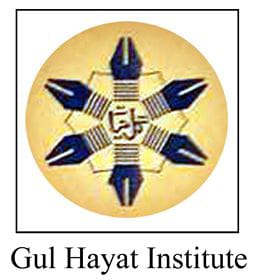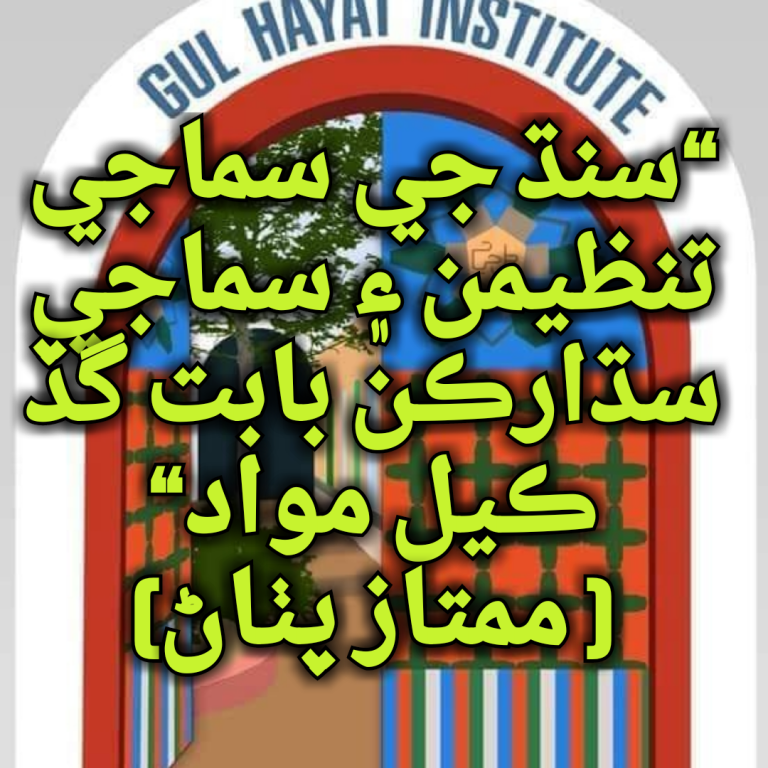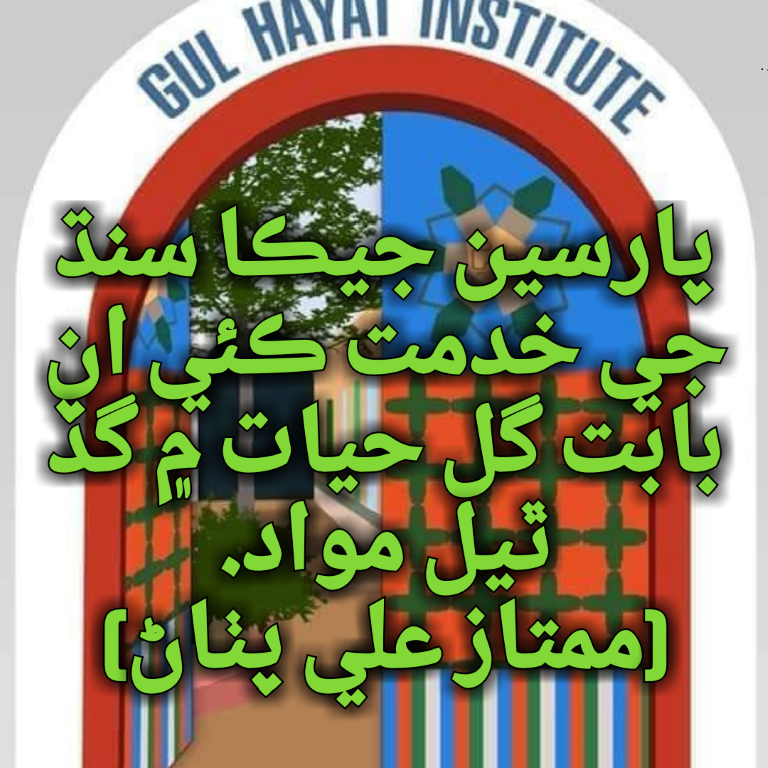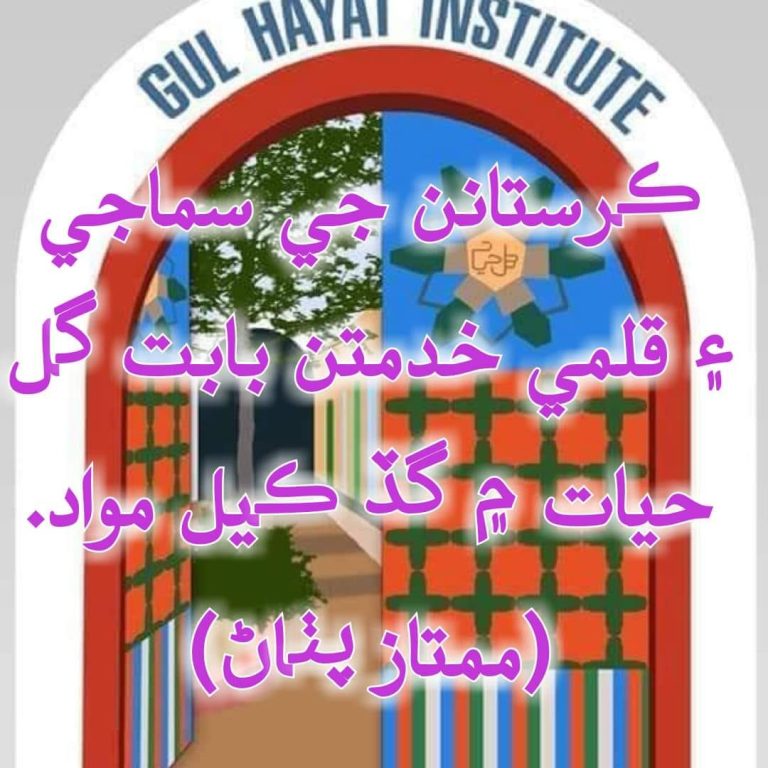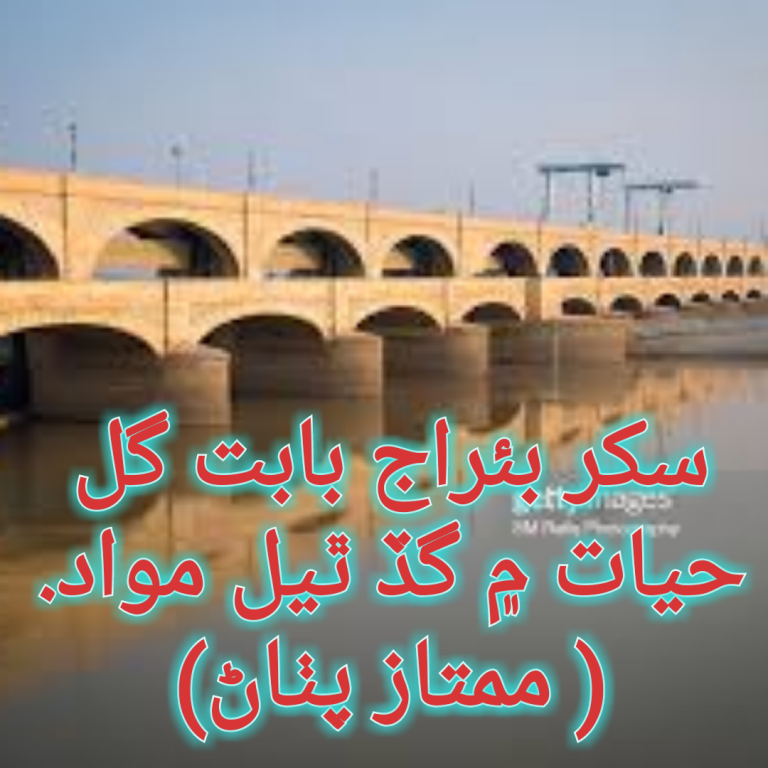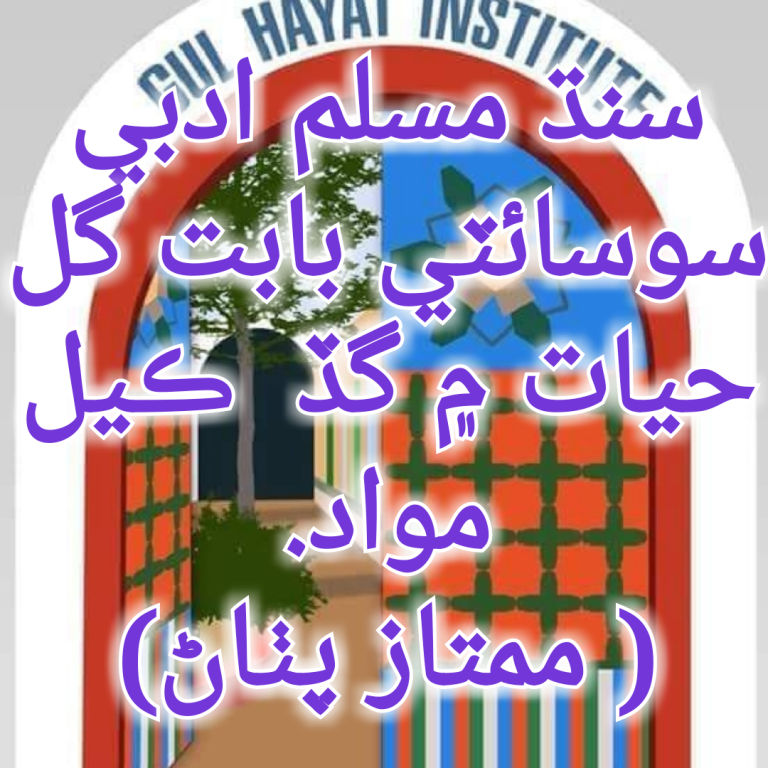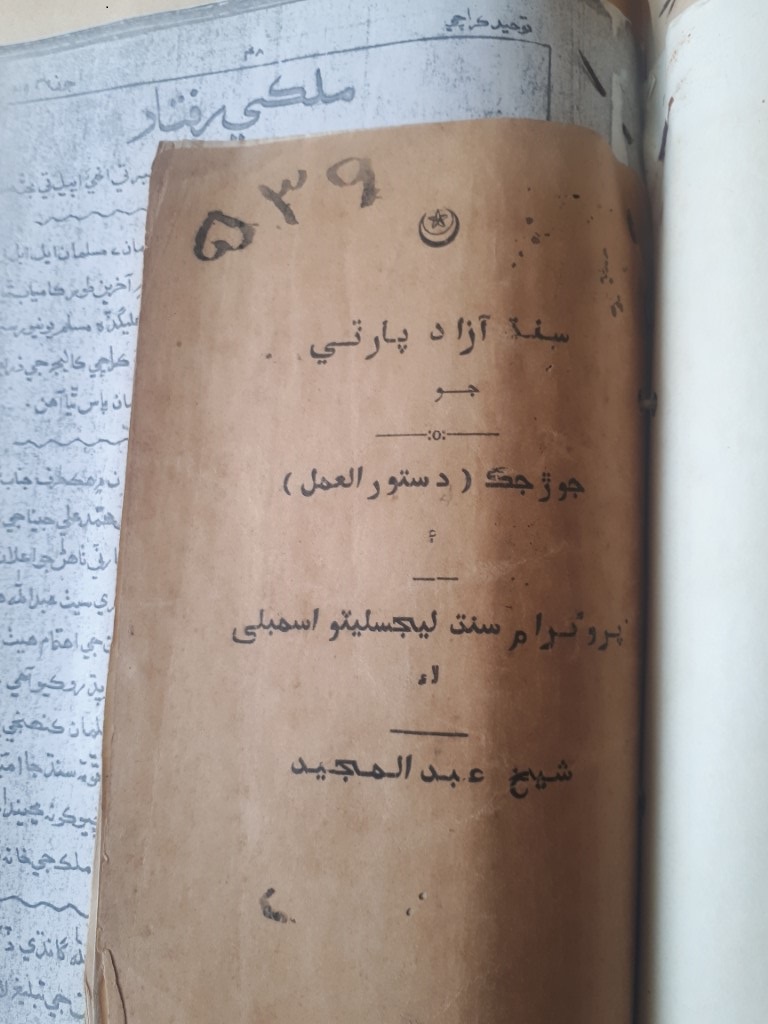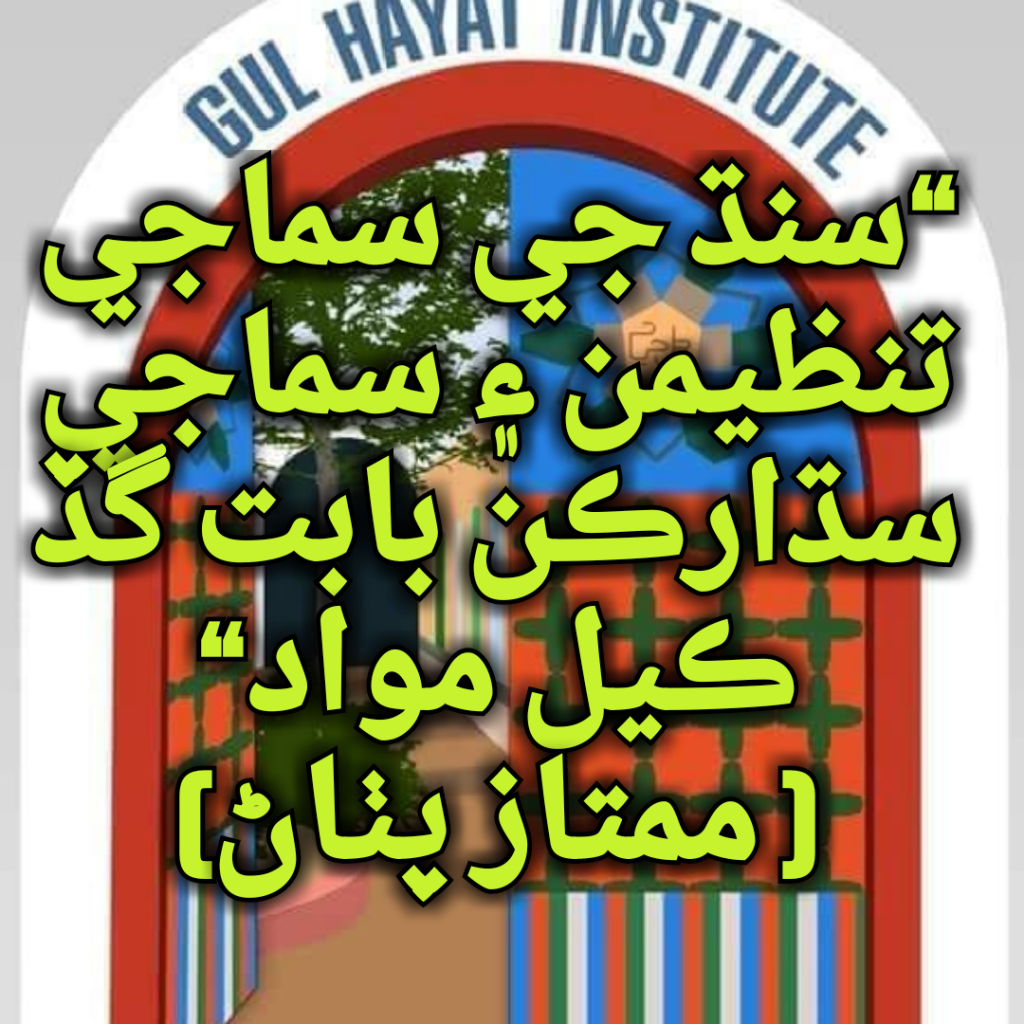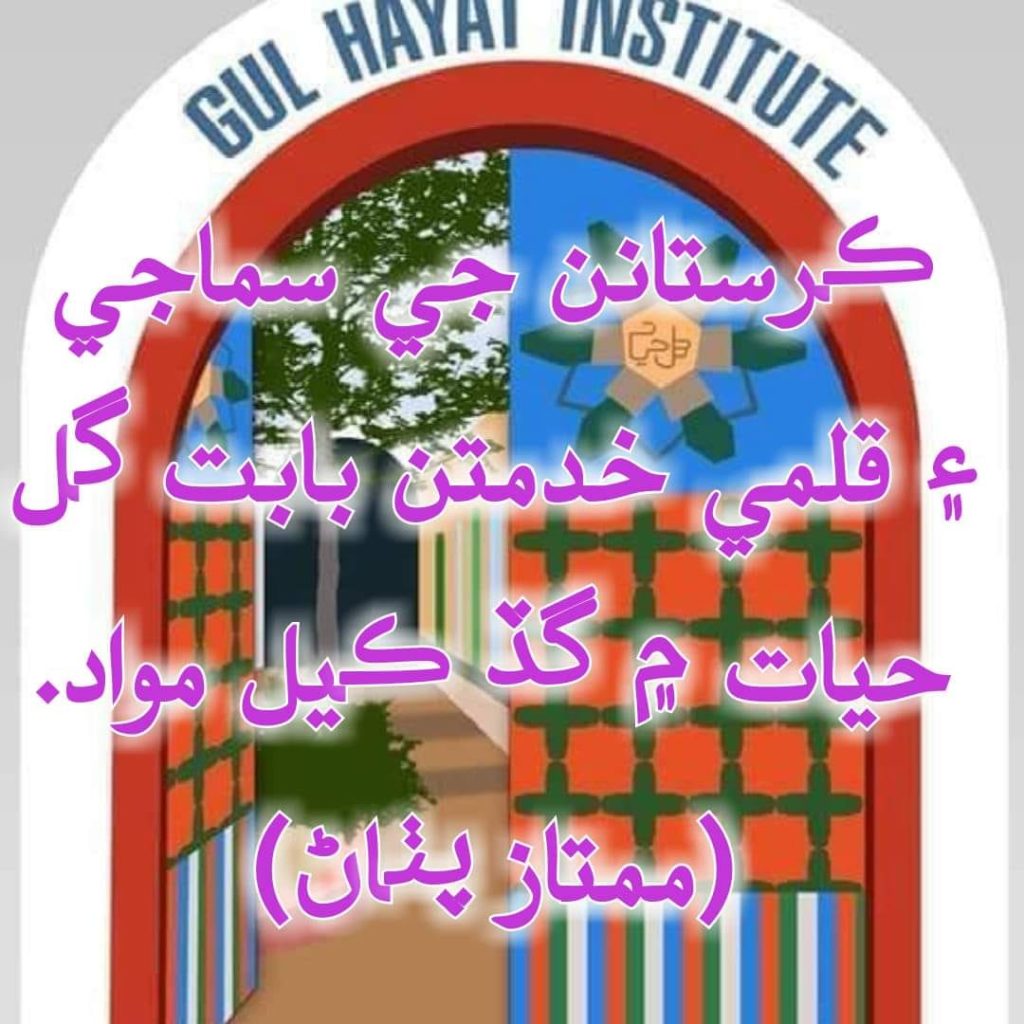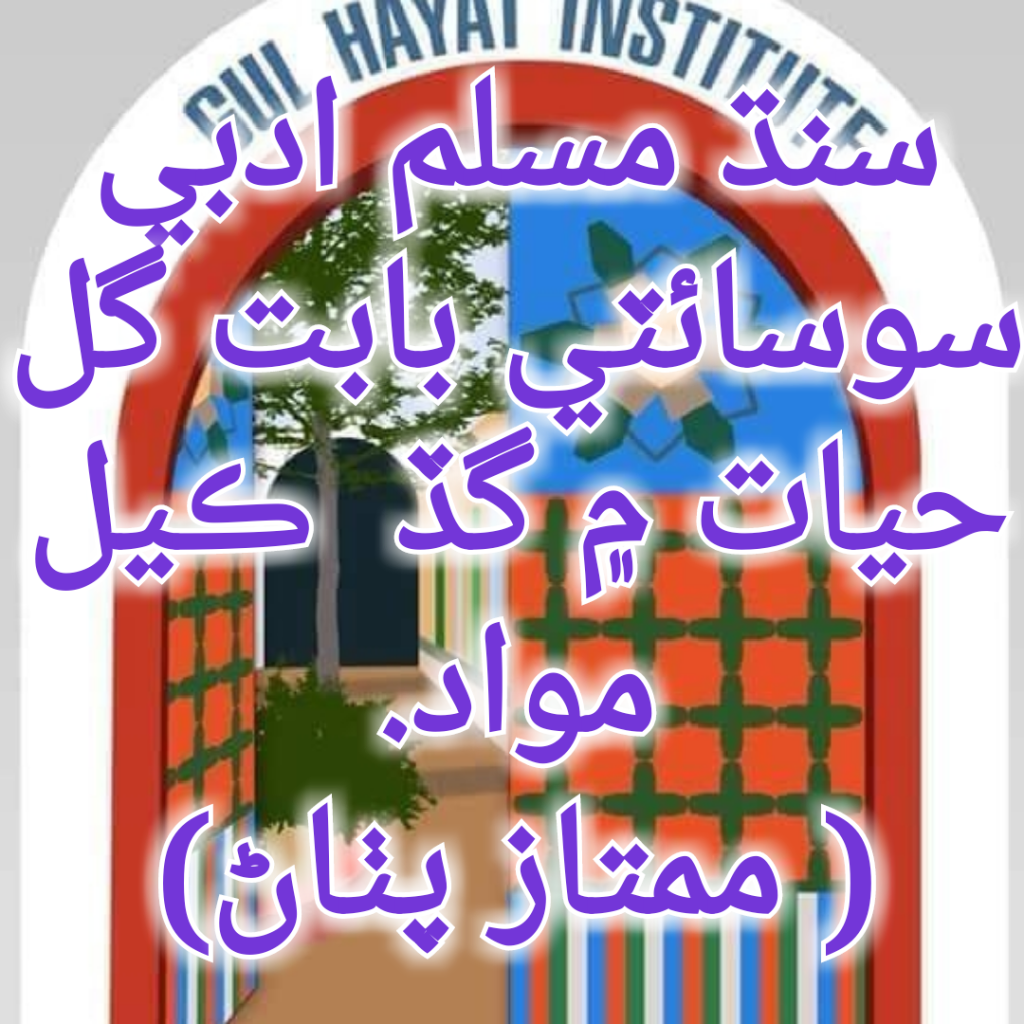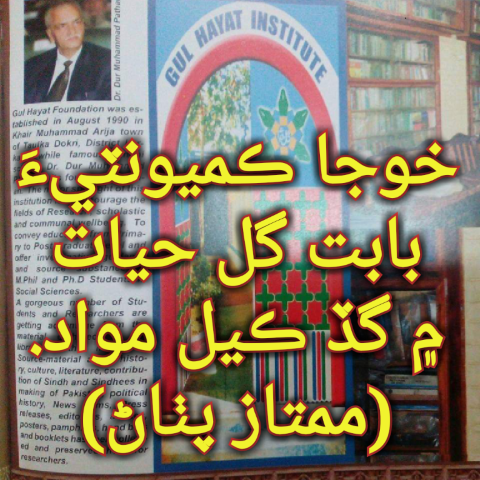PRESIDENTIAL ADDRESS OF SETH HAJI ABDOOLA HAROON
AT THE SIND PROVINCIAL CONFERENCE
1920-7th SESSION, SUKKUR.
Brother delegates, Ladies and Gentlemen!
I AM NOT using the language of mere formality when I thank you for the singular honour you have done me, by summoning me to preside at this the 7th Sind Provincial Conference. To be frank, I have done nothing to deserve such a mark of favour, and knowing, as I do my incapacity for such an office, I wish your choice had fallen on a worthier head than myself but since your mandate has come to me, I am here, in obedience to it; and I have every hope that I can count upon your support, in conducting the discussions on the various subjects that are to come before us, for our consideration.
OUR GOAL
When we look to the past grandeur of our Motherland and the height of civilization it attained, at a time when all the world around was sunk into ignorance and barbarism, the conviction becomes irresistible that the future can have nothing but sunshine, in store for us, only if we have the will to dedicate ourselves to the service of the country. The future bright as it promises to be, rests with us alone. It depends not so much on the Acts of Parliament as it does upon our own patriotism and sacrifice, for our efforts in the future as in the past are to mould the Acts of Parliament. No nation has become great without an exertion from within. It is therefore a sign of happy time that our country men are every day increasing in numbers stepping forward to strive for the great ideal for which the Indian National Congress has laboured so long. With the mention of the name of that august assembly, our thoughts go back, in grateful remembrance to the sacred memory of the immortal souls of Dadabhoy Naoroji, Allan Octavian Hume, George Yule, Ananda Mohan Bose, Sir Henry Cotton, Gopal Krisna Gokhale, Tybjee and Pherozshah Mehta who, in their farsightedness, more than a generation ago, prepared the national plank for us to stand upon and hold aloft the national banner of the United India. The plank is on firmer foundation than even before, being broad based on an immensely larger popular support. The organization of the Congress has its roots and branches scattered all over the country. The message of Home Rule has been carried to the masses and there is today a measure of political awakening which is so much a wonder even to those who started the work as it is a great hope for the early attainment of our goal. That goal is “Government of the people for the people,” and bas been variously styled Home Rule, Self Government, Responsible Government, all of which mean but the same thing. To achieve that end of our ambition, we, the children of the soil, should close our ranks even it be at some sacrifice and make a united stand. As a member of a democratic faith my advice to you can only be to press on vigorously, until the goal is reached. Mother-India, with a glorious past that knows no parallel will have a still mare glorious future that will place it at the forefront of the nations of the world. I have visions of the India of the future-the greatest democracy of the world-moulding by its high example the life and thought of its sister nations, whether of the West or the East. How distant or rather how near that future is to be is a matter which lies in the hands of this and the next generation of India’s young men and I hope and trust and pray that young Moslems and young Hindus, standing shoulder to shoulder will nobly fulfill their high mission.
REMORMS
There is a rude awakening as we turn from the enchanting visions of the future to the facts of the present, for we realize how little headway we have made towards that future. The first step vouchsafed to us in that direction is the Reform Act which was placed on the Statute Book in December last. The skeleton of that act was outlined nearly two years ago in the Montague-Chelmsford report, and although the Act has given us a stronger and a more powerful frame and here and there a vigorous muscle or two has been added the outline remains materially unaltered. Flesh and blood have yet to be supplied by the formation of numerous Rules and Regulations. The outline has under gone elaborate analysis, discussion and criticism during these two years, and I do not think any good purpose would be served by my entering, at this stage, into a discussion of the scheme at it originally was or as it was partially improved by the joint Parliamentary Committee. Nor will the full effect of the Act be correctly known, until the Rules supply the flesh and blood to the skeleton. But it is sufficiently clear that the Act does not at all satisfy the needs of the country or the wishes of the people, as a whole. The Amritsar Congress formed the platform for the presentation of three independent shades of opinion. There were those, who led by Mrs. Besant, gratefully welcomed the Reforms Act as a substantial step. There were others who led by Lokmmanya Tilak and Mr. Das held that the Act was inadequate, unsatisfactory and disappointing, there were again those who led by Mahatama Gandhi were of the opinion that although the Act was inadequate and unsatisfactory, it yet constituted a step forward and should be worked in a spirit of co-operation. Among the delegates of the Amritsar Congress the first view found hardly any support, while the respective support of the latter two views was never put to the test, for a compromise was effected between them, at a later stage and the Congress adopted the compromise, I am myself of the same view, as the Congress eventually took. But I feel that no good purpose is served by discussing as to which of the three parties held the correct view. The Reform is there on the Statute Book, good, bad or fair; and it is not in our power to make amendments in it. We have no alternative beyond working it or boycotting it. No responsible public men of any shade of political opinion, however extreme, have suggested our boycotting the Reforms. Everybody who is anybody is agreed that’ we have to work the Reforms and do our best to produce the greatest results from the Act, while, in no way, giving up work for achieving our goal. How for the Moslems will be enabled to take their share in the new Councils it is impossible for me to say, in view of the Khilafat question. But otherwise all rounds, in every province, the attention of political workers is being more and more drawn to the approaching formation of reformed councils, and the work of educating and guiding the new electorates is a subject of consideration among them. Let us therefore not be still fighting a dead issue, as to which adjective is most suitable to be applied to the Act. It is not wisdom at this stage, to be quarrelling over the transient point of dispute in what words to describe the Act. It is there as a hard fact and no amount of praise or condemnation can alter its character or increase the power it confers on the people. Let us rather-or those among us who want to participate in elections either as candidates, or voters or as workers to lay down specific programs and policies to be worked out by the people’s representatives in the new councils and commence the work of educating the electorate in light of these. Let us not unwisely waste our energies in fighting between ourselves as to what the Act is or not. Let us rather utilize our energies in fighting with Government to see what the rules are going to be. We have been neglecting this important work and will have reason to repent our negligence. As I have said above Mussalmans may not be able to take part in the Council elections, and all that I have said above has no reference to the Moslem community. Let me say by the way that the Khilafat question has assumed national significance; we shall just have to define our policy as nationalists, should the Muslims decide to withdraw from the Reformed Councils. A delicate and difficult task indeed! on the right solution of which I believe the honour of our motherland and nation depends considerably.
THE PUNJAB TREGEDY
Another All-India question of outstanding importance is the great Punjab Tragedy, of last year. I do not want to go with the familiar history of that period. It is written in letters of blood on the heart of the nation. Nor would it be appropriate to anticipate the conclusions of the official Committee of Inquiry whose report will soon be before the public. But that does not prevent us from coming to this irrefutable conclusion based on the evidence of official witnesses themselves, that the disturbances at Amritsar were the direct results of a deliberate and ca1culated policy of repression by the deportation of popular leaders and that the horrible butchery of the 13th April last the Jallianwalla Bagh will remain the darkest page in the history of the British Rule in India. The terrible inhumanity of the Martial Law period, when it is fully exposed, will be an indelible blot on the British nation, and if properly known to the other nations of the world will ruin the reputation of Great Britain, as a lover of liberty and freedom. India can never forget the spring of last year, and I have not the least doubt that the National Week-6th to 13th April will be universally observed in India, by all sections of the people; and I hope that the sum of 10 Lacs will be over subscribed. We should also appreciate Mahatma Gandhi’s advice that it is the sacrifice of the people who died, which is being memorialized and not the butchery of those who killed. No other advice could have proceeded from one who is an Apostle of Love and an Abhorer and Hate and I feel sure the speakers at the functions during the National week will remember the distinction thus made.
THE KHILAFAT QUESTION
There can be no doubt of the fact that the situation in India in regard to the Khilafat Question is so serious that it overshadows everything else and I fervently pray all may yet be well. The sincerity of British and Allied statesmen is being put to the test and solemn pledges made by them at a time of crisis await to be fulfilled. I am not hopeful of Britain carrying out its entire promise. The thirst for annexation and exploitation is still a living force in European politics and the policy of grab seems to override all considerations. The reply of the Premier of Great Britain to our Khilafat Deputation is most ominous. It clearly foreshadows peace settlement that falls short of the irreducible Moslem demands. Nothing but Constantinople is evidently to remain with the Sultan-Khalif, and that too under the kindly gaze of the Allied Artillery, if the actual military occupation of the seat of Khilafat is not prolonged indefinitely. Mr. Lyod George had pledged, in January 1918, with all true solemnity befitting the occasion of a public declaration of the A1lied war Aims that. “We are not fighting to deprive Turkey of Constantinople or of the rich and renowned lands of Asia Minor and Thrace which predominantly Turkish in race,” and yet in reply to Mr. Muhammad Ali’s statement, he is reported to have said that in Thrace the Mussalman population was in a considerable minority and in Symrna the majority of the population was non-Turkish. Are facts to be twisted to suit policy? Are broken pledges to be followed by perversions of facts? Is British statesmanship all bankrupt? The sky is dark and the Muslim World is in greater unrest than .it has been for centuries. The sky is very dark but whatever be the eventualities of the situation, I hope Muslims will ever remember the assistance given by the Hindus in making the Khilafat movement a strong All-India Movement. To all the well-wishers of the country the co-operation of Hindus with Muslims in the Khilafat question will give nothing but the sincerest pleasure. It is the sympathy at the time of one’s grief that is valued most, and I know that the hand of fellowship and company extended by them in the hour of sorrow has quickened the hearts of Muslims to its innermost. As the question has assumed a national importance, I trust every step would be by joint decision.
THE COMMISSONER’S POWERS
Having touched these All-India matters of the vital importance to the nation, I would wish to come at once to a consideration of the leading questions of Provincial interest and there can be not two opinion that the one question, which must engage our attention, before all others, is that of the position and powers of the Commissioner-in-Sind, under the Reform Act. In para 214 of the Montague-Chelmsford report, the distinguished authors, after stating some reasons why one man’s themselves thus: – “To our minds, however there is an overriding reason of greater importance than any of these. The retention of the administration of a province in the hands of a single man preclude the possibility of giving it a responsible character.” In view of this very clear emphatic statement, our complaint is that in matters, whether in transferred or reserved departments of governmental activity in which the Powers of a Governor in Council or Governor, Ministers have already been delegated to the Commissioner-in-Sind, the Minister and the improved Executive and the improved Executive Council cannot effectively determine the course .of administrative action in Sind, so long as the Commissioner enjoyed those delegated powers; and to the extent to which final disposal of matters, which in other divisions the Ministers alone can dispose of, remain with the Commissioner-in-Sind, responsible government will be non-existent many powers of direction and control over local self-governing bodies are conferred on the present Governor-in-Council. Under the Delegation Act (Commissioner-in Sind’s Act. V of 1868) a large number of these powers have been delegated to the Commissioner-in-Sind. With the introduction of the Reform Act the Powers .of the Governor-in-Council, in this behalf, will ipso facto devolve on the responsible Minister in charge of the Local Self Government, and the electorate obtains, through their, representatives, the power of controlling the administration of that department. But if the Commissioner-in-Sind continues the enjoyment of his present delegated powers in respect of local self-governing bodies, the Minister in charge of the portfolio cannot respond to the pressure of the electorate of the Council, so far as Sind is concerned, since he has not final voice in the department so long as the delegation holds good. This only means that Sind does not get any material benefit from the Reforms Act, so far at least as the Transferred Subjects are concerned. In regard to Reserved Subjects also, it will be denied much of the advantages of an improved Executive Council with larger Indian representation in it. If Sind is to receive the full benefit of the new Reforms there is no alternative left to the Government but to take up at once the question of placing the Commissioner-in-Sind, in the same position, as the Commissioners of other divisions of the Presidency. Public opinion of all shades is dead against the present exceptional position of the Commissioner-in-Sind and ever since the question of India Reforms was taken up by the political leaders of the country, this local reforms has been the subject of consideration in the public, press and at the political conferences of the Province. The people Hindus and Muslims are not convinced that the local autocracy must end and I feel sure that they will neither get nor give peace until this is done. The antiquated reasons on which the exceptional treatment of Sind was based, have no longer any application unless it be that Sind has seen no progress during the 77 years of British rule, and earlier the Government of Bombay revises the present system of administration the better it will be for both the people and the Government.
REPRESSION IN SIND
I do not base the above on any particular incidents of Sind Administration and my reference to two of them should not be taken as arguments or illustration in support of our claim. But they are of such great importance from other points and bear so vitally on the relations between the people and the Government that I feel I must make a pointed reference to them.
Brother Delegates, you all know of the aberration of mind which the unfortunate of Sind official underwent, during April last. They appeared to have been obsessed with the happenings in Punjab and losing their balance completely they launched on a policy of repression in a province than which none other wore a more peaceful appearance. They started with indiscriminate house-searches at Karachi, of men above all suspicion of conspiring against Government in any fashion and thought it wisdom to prosecute Mr. Durgadas, B. Advani and Mr. H. D. Mariwalla for a small leaflet alleged to have been seditious, which should not have, in any case, upset the peace of mind of any sober mind. But it unfortunately did and undue and severe sentences were passed against both of them. In Hyderabad incidents were even worse. Six respectable political workers of the town, including a man of the position of the Honorable Mr. G. M. Bhurgri were made the victims of a conspiracy by the officials. A false “first report” was trumped up against them, whose truth the Government themselves had to deny, in the Bombay Council. Five of them were arrested and let on heavy sureties and personal recognizance, but the concocted plot was exposed and the Local officials had to beat a retreat with such farce as they could command. In the meantime another trial far sedition was launched at Hyderabad and this time the popular Editor of “the Hindvasi” Mr. Jethmal Parsaram became their victim. Mr. Jethmal fared no better than his Karachi friends, but thanks to His Majesty’s proclamation, and our friends were released, after a month’s excellent mental and physical training, and are again back in our midst for the country, each according to his lights.
SIND OFFICIALS AND KHILAFAT
Another illustration of Rowdyism in Sind was the mean attempt of some officials. I am ashamed to say Mussalman officials at least they profess to be so-to use their official position and influence to set on foot and maintain an anti-Khilafat agitation in Sind. Under the belief that illiterate mass of Sind Muslims, already living In great dread of officialdom, offered the best material far a propaganda which country to the beliefs and feelings of practically the entire Moslem community of India, two Mussalman officials, occupying a position of great trust and influence stooped to any and every means to make Mussalmans declare false views and propagate false beliefs. This artificial agitation against the Khilafat was carried on with a high handedness, boldness and impunity which greatly compromised the position of the Commissioner-in-Sind and the Bombay Government, and when open allegations of the methods employed to coerce Moslem opinion were made in the press, the Sind administration chose to remain quiet far a long time and the two officials went on managing the stage show for months, the public came naturally to believe that the Government wanted this agitation and the officials were mere agents. I am glad to say that the Government was ultimately made to realize the grave inadvisability and inexpediency of this belief gathering more strength or acquiring any plausible basis, by its continued silence and H. E. the Governor of Bombay had to warn the officials not to take any part in the movement. While we are thankful that the Government saw the wisdom of a public disavowal and condemnation of the officials, we must reiterate here our demand for a full and independent inquiry into the allegations of coercion employed by those officials and their underlings. Does Government expect that all who have been victims of this coercion and those who have suffered for their courageous stand for what they regard as truth must pocket the insults, the threats and worse because Government has a tender regard for the prestige of an official who has abused his powers. Is this a wise or statesmanlike attitude to take up in such a matter? The Larkana Khilafat Conference put their case for an enquiry before the Government of Bombay, in the form of a memorial and appointed a deputation to wait upon His Excellency the Governor. Not only was the deputation denied a personal interview, but the enquiry itself was refused. One cannot appreciate the logic of the Government position. If the allegations of the public so openly and persistently made are false, government will have proved, beyond dispute, the correctness of their present position viz that they do not think there is ground for any complaint of coercion and Government will have a strong and effective argument for future use, if public made unreasonable demands for inquiry on any other matters. If however the allegations are proved to be correct, government will only have given an opportunity to punish the guilty for an offence actually proved, and to punish the guilty official or non official is one of the functions of the government, and we shall have deserved the thanks of government for helping it to discharge its functions aright. I hope that Sir George Lloyd yet see the reasonableness of our request and concede it at an early date.
THE 19TH MARCH
His Excellency Sir George Lloyd, in speaking of the warning he had administered to the government subordinates on account of their taking part in the anti Khilafat movement spoke of it as a “religious controversy,” and now the government circularizes the Khilafat movement to be a political one, and we have probably therefore the spectacle of a number of District Magistrates in Sind, making as much use of the Bombay District Police Act as they possibly could, in gagging the Muslims. The Khilafat movement, as it has repeatedly been urged is essentially a religious movement, and therefore any interference with it is calculated to cause, as experience shows, the greatest possible resentment. Indians are a peaceful people. They want to live and let others live; and therefore in the case of such a people unnecessary provocation is at once justifiable. In Karachi section 42 of the Police Act was promulgated in the Municipal and cantonment areas, while in Hyderabad, Sukkur and some other places notices under it were served on individuals. Not satisfied with the extremely elastic and all embracing wording of the section, the District Magistrate of Hyderabad went out of his way and beyond the scope of the section in notifying that the “declaration of any class of persons” as “Kaffirs” or “outcastes” or similar expressions are within the scope of the order. . . .”. It is well known that in the Holy Quran the word “Kaffir” occurs pretty often, and suppose a man read a portion having that word, will section 42 of the Police Act, as understood by the magistrate make him liable to a prosecution? If it does it is a clear interference with the religious liberty of the people. “Outcastes” again do not form a class by themselves. They are at the most as has always been the case, a few individuals. Therefore giving them the position and dignity of a “a class” of people is an absurd attempt to prevent people from adjusting their social relations with these individuals, who have, by their behavior dropped out of the community. It is therefore clearly outside the province of a magistrate to take upon himself the supervision of the social matters of the community. Here in Sukkur, we have read in the papers in what manner our much respected Chairman of the Reception Committee Mr. Virumal Begraj has been served with “summons” by a Police subordinate. Such unnecessary and often times vexatious exhibitions of the official powers do not serve any useful purpose, but they go a long way in creating estrangement between the officials and the people, and the sooner Sind officialdom shakes off its old traditions of displaying its strength, on unnecessary occasions, the better it would be for all concerned.
HINDU MUSLIM UNITY
Brother delegates! Inspite of the whole atmosphere being surcharged with deep anxiety and the sky being overcast with dark clouds, there is a welcome silver lining. The on rush of a feeling of oneness among the Hindus and Moslems of India, at this time of grave crises, has deepened the foundations of the Hindu Moslem Unity, and this partnership, in distress, will, I hope, one day blossom in partnership in happiness, when our goal is achieved. The unity between the two communities is not a new thing. It is as old as the coming of Islam into India. The religion and the everyday conduct of Moslems can permit of no barrier to separate them from their neighbors. The Hindus and moreover if it be remembered that most of the Indian Mussalmans are of the same origin as the Hindus, there can be nothing that can really be an obstacle in the Hindu-Muslim entente. In the past, as History amply proves, Hindus and Muslims have been the best of best neighbors, sincere friends, and faithful comrades and a little, on both the sides, would strengthen the solidarity between the two communities and mould them into one, great nation. It cannot be denied that petty jealousies, over petty objects, and backward state of modern education, among Muslims, had contributed a good deal, to great in recent times, a feeling of distrust among the educated sections of the two communities. Happily the masses, to very great extent remained unaffected by the feelings of the educated strata and with a little effort at sincerity towards one another Hindu-Muslim unity has come to have a remarkable revival. I am certain that the spread of education, among Muslims, will prepare them to take their share of the national obligations more readily than they have done in the past. I already see that one of the greatest results of the present Hindu-Muslim entente is the spirit of nationalism that is taking a firm root in the Muslim mind and as time goes on Muslims will be found to be working for the good of the country not less enthusiastically and strenuously than the Hindus. Muslims cannot afford to neglect the interest of the Indian Nation, just as Hindus should not remain indifferent to the comparative backwardness of the Muslims. Each needs the other, and each must exert to co-operate with the other. I trust that steps would be taken to bring home to the masses the message of Hindu-Muslim unity, and I have every hope that the unpleasant criticism we sometimes hear, in the Civil Courts, about the high rate of interest charged in the mofussil, will have ere long, ceased to exist.
I find from the public press that the Hindus of Sind have not been given their due share of the seats, available for the Hindus of the whole Presidency, on the new provincial Legislative Council. Between these two sections of the same community, the distribution of the representation on the reformed councils has not been fair and just. The voting strength of Sind Hindus entitles them to four seats, whereas they have been given only two. The fact that Government and the National Congress and Muslim League have recognized the claim of a minority to receive favorable treatment further strengthens the claim of the Sind Hindus, and I think that the Mussalmans of Sind as Sindhis, ought to extend their whole-hearted support to Sind Hindus, in obtaining from the Bombay Hindus, two additional seats to make up their fair share of representation. I understand that the Hindus have placed their case before the Reform Commissioner appointed for Bombay province, but the claim has not yet been conceded to. I hope that the claim will be placed and strongly pressed before higher authorities and that it will receive the cordial support of the Mussalmans of Sind.
JOINT RECONCILATION BOARDS
Since a long time the suggestion of forming joint Reconciliation Boards, to adjust civil and communal disputes, without the intervention of Courts, has been, before the public; and it is a great pity that we, in Sind, have all along slept over it. Private arbitration would not only save time and money, but would considerably diminish the number of such cases and would give a healthy tone for the life of the people. It seems to me that the Joint Boards should be created not only to settle disputes between Hindus and Muslims, but also between Hindus and Hindus and between Muslims and Muslims themselves. The time is now ripe for giving a practical shape to the proposal and so far as I can see the public is really to respond Social relations between the two communities, particularly in large towns also stand in need of reconsideration and I would urge the leaders to devise means for their reconstruction in view of the growing harmony and the present day demands of the Society and Nation.
SWADESHI
Necessity has successfully goaded our people, in Sind, to prefer the Khathas to the costly blankets and as a substitute for the foreign flannel and woolen cloth prepared in the Deset has been made use of in a large quantity. The demand for woolen materials prepared in the Deset far exceeds the supply, but I hear, on reliable authority, that a little financial assistance to the weavers would bring to Sind larger stock, than has hitherto come. It is not only the woolen materials that we can get locally so cheaply, but decent cotton cloth for shirting and other purposes would easily become procurable and is obtainable even now, though its quantity may not be sufficient. The necessity for cheaper and more durable cloth is very great and urgent. Once the Swadeshi material, howsoever coarse it may be, is on the market, there remains not the least necessity for canvassing for it. All that is needed is capital, and I venture to hope that our leading men in the Province, Peers and Zamindars and Capitalists will take steps to advance some money to weavers, who are now abandoning their ancestral profession to enable them to restart their work. It would be advantageous to have a system of exhibitions of the country made cloth at the fairs, so numerous in Sind. Every village or a group of villages should have enough of hand looms to meet the demands and already Swedshism in cloth is so much in prominence in Sind that it only requires putting our shoulder to the wheel. We mercantile class in the commercial centres is quite absorbed in foreign trade and speculation thereby acting as agents of the exploiters. We have been certainly great sinners to our motherland and children of the soil past, present and the future. Time has come when we should make amends and devote suffice attention to country made articles and provide them in the market: I see a wave of enthusiasm all round in this respect and people are eager to patronize even with some sacrifice. I fervently beg and appeal to my fellow businessmen to open eyes and the bright possibilities before them and invest their capital for the great good of Bharat Land.
RASAI COMMITTEE
Nearly two years have passed away, and we do not know anything about the results of the labors of the Rasai Committee. We have seen it in the past and we see it till today that whenever a Committee is appointed by Government to investigate any Sind grievance, the publication of the report of it takes a number of years. The evils of Rasai Lapo and Cheer are there, and it is the duty of the Government to take immediate steps to issue their orders without further delay.
I least expect improvement in these evil systems, whatsoever be the recommendations of the Committee or the orders of the Government. In my opinion landholders, who are victims of these extortions are they to blame and they prepare themselves to be men. I call upon the Zamindars, most of whom profess the same faith as I, to join hands in the working of national regeneration. In the Quran we find a passage conveying deep meaning in which God has said that, no change will come into the lot of any Nation unless it takes pains to do so. You possess heads and hearts to realize and understand famine, poverty, pestilence, all sorts of evils, disease, and high mortality are order of the day in our Beautiful Country. O’do knows that you have lost much of your vitality, by subjection, rivalry amongst yourselves and lethargy and your case is evidently hopeless. In India if any class has suffered most it is yours and those under you.
The material/data/information can be provided on request
